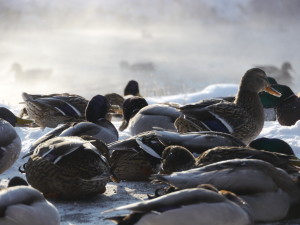 Late-season duck hunting is like the final innings of a ball game, where both teams are tired and wary, and not wanting to take any chances or give anything away. But that’s also the beauty of late-season duck hunting, because it gives patient hunters’ one final kick at the can, especially since most of the other hunters will have moved on. There’s less competition to bag the late migrating mallards before they too move on south.
Late-season duck hunting is like the final innings of a ball game, where both teams are tired and wary, and not wanting to take any chances or give anything away. But that’s also the beauty of late-season duck hunting, because it gives patient hunters’ one final kick at the can, especially since most of the other hunters will have moved on. There’s less competition to bag the late migrating mallards before they too move on south.
If you want to hunt those big red-legged mallards that come down at the end of the season, then here are a few tips that might make your trips worthwhile:
LOCATING THE BIRDS
Because it is relatively colder and the temperatures often dipping below freezing, late-season ducks are denied their typical feeding and loafing areas. As a result, they’ll quickly seek out the available open water. When looking for last remaining open water duck hunting opportunities, therefore, look for smaller rivers with sand bars, creeks and small moving waterways that still have unfrozen pools and jetties in and around them.
BLINDS
Duck hunting this late in the season also means you need to give special attention to your blinds. By now, the ducks have “been there, done that,” and will quickly spot a blind that doesn’t quite fit in with the terrain. Make sure you camouflage your blind fully, with as much natural surrounding vegetation as possible, making it blend completely in with the setting around the area you’re gone to be hunting. A good tip to use to conceal your blind is: If you feel you’re blind is brushed enough…brush it even more!
DECOYS
Hunting these last migrating ducks brings forth a “Whole different” kind of bird, and hunters must factor that into their hunting strategies too. By now, the molt stage has long been over and the ducks will be radiant and all plumed out. So, when they see decoys in the field covered with mud and debris, worn-out decoys, they will surely spot it and do a fly by – tempting though the open waters below may look!
The trick for success duck hunting Missouri during the late season is to set aside a few newer decoys (at least a couple dozen or so) at the start of the season. Then, bring them out late during the season, so they resemble the bright and iridescent plumage of the ducks. Alternately, you can use your older decoys by applying a fresh coat of paint or even better yet by flocking them, making them look as realistic-looking as you can.
CALLING
Unlike early or younger birds, when you go duck hunting near the end of the season, you should know that these ducks are well seasoned by now, and have survived every ploy that hunters have used to trick them so far this season. In the wild, ducks will not usually call to approaching flocks – and so shouldn’t either.
Call only if the ducks that are close and are looking for a place. And then, there’s no need to overcall. As soon as you see the ducks turning back towards your blind, stop calling or go on to feed chatter along with some lone hen quacks and occasional Mallard Drake whistles – otherwise they will suspect something is amiss!
A good rule of thumb when hunting these older, wiser ducks is to call at the edges, there is no reason to call at a duck that is coming in to you. If they start to fade off, you just want to call enough to turn them back toward you, finessing the ducks subtly with your calling.
Following these simple tips and learning to read the birds will enable you to have a successful late-season Missouri duck hunting experience.






